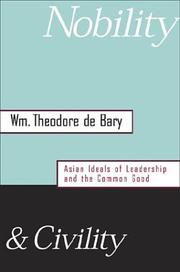| Listing 1 - 7 of 7 |
Sort by
|
Book
ISBN: 0860082385 9780860082385 Year: 1978 Publisher: Tokyo: University of Tokyo press,
Abstract | Keywords | Export | Availability | Bookmark
 Loading...
Loading...Choose an application
- Reference Manager
- EndNote
- RefWorks (Direct export to RefWorks)
Authority --- Japan --- Social conditions --- J4000.80 --- J4010 --- J4121 --- Political science --- Authoritarianism --- Consensus (Social sciences) --- Japan: Social history, history of civilization -- Gendai (1926- ), Shōwa period, 20th century --- Japan: Social sciences in general -- ideology, socio-political and socio-economic movements --- Japan: Sociology and anthropology -- leadership and loyalty --- Social conditions. --- Japan - Social conditions
Book
ISBN: 1503606406 9781503606401 9781503605053 1503605051 9781503613614 1503613615 Year: 2018 Publisher: Stanford, California
Abstract | Keywords | Export | Availability | Bookmark
 Loading...
Loading...Choose an application
- Reference Manager
- EndNote
- RefWorks (Direct export to RefWorks)
Although democracy is, in principle, the antithesis of dynastic rule, families with multiple members in elective office continue to be common around the world. In most democracies, the proportion of such "democratic dynasties" declines over time, and rarely exceeds ten percent of all legislators. Japan is a startling exception, with over a quarter of all legislators in recent years being dynastic. In Dynasties and Democracy, Daniel M. Smith sets out to explain when and why dynasties persist in democracies, and why their numbers are only now beginning to wane in Japan—questions that have long perplexed regional experts. Smith introduces a compelling comparative theory to explain variation in the presence of dynasties across democracies and political parties. Drawing on extensive legislator-level data from twelve democracies and detailed candidate-level data from Japan, he examines the inherited advantage that members of dynasties reap throughout their political careers—from candidate selection, to election, to promotion into cabinet. Smith shows how the nature and extent of this advantage, as well as its consequences for representation, vary significantly with the institutional context of electoral rules and features of party organization. His findings extend far beyond Japan, shedding light on the causes and consequences of dynastic politics for democracies around the world.
Politicians --- Families --- Incumbency (Public officers) --- Political parties --- Democracy --- Public officers --- Family --- Family life --- Family relationships --- Family structure --- Relationships, Family --- Structure, Family --- Social institutions --- Birth order --- Domestic relations --- Home --- Households --- Kinship --- Marriage --- Matriarchy --- Parenthood --- Patriarchy --- Statesmen --- Political aspects --- Social aspects --- Social conditions --- Japan --- Politics and government --- J4600.90 --- J4121 --- Japan: Politics and law -- history -- postwar Shōwa (1945- ), Heisei period (1989- ), contemporary --- Japan: Sociology and anthropology -- leadership and loyalty

ISBN: 0674015576 0674030672 9780674030671 9780674015579 Year: 2004 Publisher: Cambridge, Mass. Harvard University Press
Abstract | Keywords | Export | Availability | Bookmark
 Loading...
Loading...Choose an application
- Reference Manager
- EndNote
- RefWorks (Direct export to RefWorks)
Globalization has become an inescapable fact of contemporary life. Some leaders, in both the East and the West, believe that human rights are culture-bound and that liberal democracy is essentially Western, inapplicable to the non-Western world. How can civilized life be preserved and issues of human rights and civil society be addressed if the material forces dominating world affairs are allowed to run blindly, uncontrolled by any cross-cultural consensus on how human values can be given effective expression and direction? In a thoughtful meditation ranging widely over several civilizations and historical eras, Wm. Theodore de Bary argues that the concepts of leadership and public morality in the major Asian traditions offer a valuable perspective on humanizing the globalization process. Turning to the classic ideals of the Buddhist, Hindu, Confucian, and Japanese traditions, he investigates the nature of true leadership and its relation to learning, virtue, and education in human governance; the role in society of the public intellectual; and the responsibilities of those in power in creating and maintaining civil society. De Bary recognizes that throughout history ideals have always come up against messy human complications. Still, he finds in the exploration and affirmation of common values a worthy attempt to grapple with persistent human dilemmas across the globe.
S12/0216 --- S02/0100 --- S02/0200 --- S11/0708 --- J4121 --- J4000 --- J4600.10 --- Leadership --- -Civil society --- -Leadership --- -Ability --- Command of troops --- Followership --- Social contract --- China: Philosophy and Classics--Political philosophy --- China: General works--China (and Asia) general surveys: before 1949 --- China: General works--Civilization and culture --- China: Social sciences--Elite --- Japan: Sociology and anthropology -- leadership and loyalty --- Japan: Social sciences in general, social history --- Japan: Politics and law -- history -- earliest and premodern --- Asia --- -History --- History --- Religious aspects --- -Confucianism --- -Hinduism --- -Buddhism --- #A0507PSA --- Government - Asia --- Government - Non-U.S. --- Law, Politics & Government --- Civil society --- History. --- Buddhism. --- Confucianism. --- Hinduism. --- -China: Philosophy and Classics--Political philosophy --- Ability --- Religious aspects&delete& --- Buddhism --- Confucianism --- Hinduism

ISBN: 1281966770 9786611966775 0226894118 9780226894119 9781281966773 0226894088 9780226894089 6611966773 Year: 2006 Publisher: Chicago University of Chicago Press
Abstract | Keywords | Export | Availability | Bookmark
 Loading...
Loading...Choose an application
- Reference Manager
- EndNote
- RefWorks (Direct export to RefWorks)
A leader of a global superpower is betrayed by his mistress, who makes public the sordid details of their secret affair. His wife stands by as he denies the charges. Debates over definitions of moral leadership ensue. Sound familiar? If you guessed Clinton and Lewinsky, try again. This incident involved former Japanese prime minister Sosuke Uno and a geisha. In Secrets, Sex, and Spectacle, Mark D. West organizes the seemingly random worlds of Japanese and American scandal-from corporate fraud to baseball cheaters, political corruption to celebrity sexcapades-to
Scandals --- Law --- Anglo-American law --- Law, Anglo-American --- History --- Japan --- United States --- Social life and customs. --- J4121 --- J4600.90 --- Japan: Sociology and anthropology -- leadership and loyalty --- Japan: Politics and law -- history -- postwar Shōwa (1945- ), Heisei period (1989- ), contemporary --- E-books --- scandal, taboo, japan, japanese, asia, asian, east, eastern, united states, usa, america, american, global, international, interpersonal, media, betrayal, infidelity, mistress, wife, affair, drama, moral, ethical, prime minister, geisha, fraud, cheating, cheater, corruption, behavior, public, private, dignity, rules, phenomenon, social life, customs, privacy, law, defamation.

ISBN: 9780824829988 0824864514 1435665996 9780824864514 9781435665996 0824829980 Year: 2006 Publisher: University of Hawai'i Press
Abstract | Keywords | Export | Availability | Bookmark
 Loading...
Loading...Choose an application
- Reference Manager
- EndNote
- RefWorks (Direct export to RefWorks)
"On September 13, 1912, the day of Emperor Meiji's funeral, General Nogi Maresuke committed ritual suicide by seppuku (disembowelment). It was an act of delayed atonement that paid a debt of honor incurred thirty-five years earlier. The revered military hero's wife joined in his act of junshi ("following one's lord into death"). The violence of their double suicide shocked the nation. What had impelled the general and his wife, on the threshold of a new era, to resort so drastically, so dramatically, to this forbidden, anachronistic practice? The nation was divided. There were those who saw the suicides as a heroic affirmation of the samurai code; others found them a cause for embarrassment, a sign that Japan had not yet crossed the cultural line separating tradition from modernity.While acknowledging the nation's sharply divided reaction to the Nogis' junshi as a useful indicator of the event's seismic impact on Japanese culture, Doris G. Bargen in the first half of her book demonstrates that the deeper significance of Nogi's action must be sought in his personal history, enmeshed as it was in the tumultuous politics of the Meiji period. Suicidal Honor traces Nogi's military career (and personal travail) through the armed struggles of the collapsing shôgunate and through the two wars of imperial conquest during which Nogi played a significant role: the Sino-Japanese War (1894-1895) and the Russo-Japanese War (1904-1905). It also probes beneath the political to explore the religious origins of ritual self-sacrifice in cultures as different as ancient Rome and today's Nigeria. Seen in this context, Nogi's death was homage to the divine emperor. But what was the significance of Nogi's waiting thirty-five years before he offered himself as a human sacrifice to a dead rather than living deity? To answer this question, Bargen delves deeply and with great insight into the story of Nogi's conflicted career as a military hero who longed to be a peaceful man of letters. In the second half of Suicidal Honor Bargen turns to the extraordinary influence of the Nogis' deaths on two of Japan's greatest writers, Mori Ôgai and Natsume Sôseki. Ôgai's historical fiction, written in the immediate aftermath of his friend's junshi, is a profound meditation on the significance of ritual suicide in a time of historical transition. Stories such as "The Sakai Incident" ("Sakai jiken") appear in a new light and with greatly enhanced resonance in Bargen's interpretation. In Sôseki's masterpiece, Kokoro, Sensei, the protagonist, refers to the emperor's death and his general's junshi before taking his own life. Scholars routinely mention these references, but Bargen demonstrates convincingly the uncanny ways in which Sôseki's agonized response to Nogi's suicide structures the entire novel. By exploring the historical and literary legacies of Nogi, Ôgai, and Sôseki from an interdisciplinary perspective, Suicidal Honor illuminates Japan's prolonged and painful transition from the idealized heroic world of samurai culture to the mundane anxieties of modernity. It is a study that will fascinate specialists in the fields of Japanese literature, history, and religion, and anyone seeking a deeper understanding of Japan's warrior culture." -- Publisher's description.
J2284.70 --- J5931 --- J5009 --- J4121 --- J4234 --- Japan: Genealogy and biography -- biographies -- kindai (1850s- ), bakumatsu, meiji, taishō --- Japan: Literature -- modern fiction and prose (1868- ) -- criticism --- Japan: Language -- theory, methodology and philosophy --- Japan: Sociology and anthropology -- leadership and loyalty --- Japan: Sociology and anthropology -- social pathology -- suicide --- Japanese literature --- Suicide in literature. --- Seppuku. --- Hara-kiri --- Harakiri --- Suicide --- History and criticism. --- Natsume, Sōseki, --- Mori, Ōgai, --- Nogi, Maresuke, --- Nogi, Kiten, --- 乃木希典, --- Mori, Rintarō, --- Ōgai, Mori, --- Ōgai Gyoshi, --- 森鷗外, --- 森〓外, --- 森鸥外, --- 森林太郎, --- 鷗外漁史, --- Natsume, Kinnosuke --- Sōseki, Natsume --- Sōseki --- Hsia-mu, Shu-shih --- Xiamu, Shushi --- 夏目, 漱石 --- 夏目, 金之助 --- Criticism and interpretation. --- In literature.

ISBN: 0801434920 9780801434921 9780801489822 0801489822 1501720309 1501720295 Year: 2005 Publisher: Ithaca (N.Y.): Cornell university press,
Abstract | Keywords | Export | Availability | Bookmark
 Loading...
Loading...Choose an application
- Reference Manager
- EndNote
- RefWorks (Direct export to RefWorks)
Two late-developing nations, Japan and Italy, similarly obsessed with achieving modernity and with joining the ranks of the great powers, have traveled parallel courses with very different national identities. In this audacious book about leadership and historical choices, Richard J. Samuels emphasizes the role of human ingenuity in political change. He draws on interviews and archival research in a fascinating series of paired biographies of political and business leaders from Italy and Japan. Beginning with the founding of modern nation-states after the Meiji Restoration and the Risorgimento, Samuels traces the developmental dynamic in both countries through the failure of early liberalism, the coming of fascism, imperial adventures, defeat in wartime, and reconstruction as American allies. Highlights ofMachiavelli's Children include new accounts of the making of postwar Japanese politics-using American money and Manchukuo connections-and of the collapse of Italian political parties in the Clean Hands (Mani Pulite) scandal.The author also tells the more recent stories of Umberto Bossi's regional experiment, the Lega Nord, the different choices made by Italian and Japanese communist party leaders after the collapse of the USSR, and the leadership of Silvio Berlusconi and Ishihara Shintar on the contemporary right in each country.
J4600.70 --- J4121 --- J2284.70 --- Political leadership --- -Political leadership --- -Leadership --- Japan: Politics and law -- history -- Kindai (1850s- ), bakumatsu, Meiji, Taishō --- Japan: Sociology and anthropology -- leadership and loyalty --- Japan: Genealogy and biography -- biographies -- kindai (1850s- ), bakumatsu, meiji, taishō --- History --- -History --- -#A0507PO --- -Japan: Politics and law -- history -- Kindai (1850s- ), bakumatsu, Meiji, Taishō --- Leadership --- #A0507PO --- Italy --- 19th century --- 20th century --- Japan --- Geschichte 1800-2000. --- Internationaler Vergleich. --- Leadership politique --- Leiderschap. --- Political leadership. --- Politische Führung. --- Rezeption. --- Histoire --- Machiavelli, Niccolò, --- Machiavelli, Niccolò. --- Chōsen Kōgei Kenkyūkai. --- 1800-1999. --- Italien. --- Italy. --- Japan. --- JP / Japan - Japon --- IT / Italy - Italië - Italie --- 92 --- Geschiedenis. --- Histoire. --- History. --- 92 Geschiedenis. --- 92 Histoire. --- 92 History. --- Geschiedenis --- Italie --- 19e siècle --- 20e siècle --- Japon --- Benso, Camillo --- Itō, Hirobumi --- Yamagata Aritomo --- Rossi, Alessandro --- Ōkubo Toshimichi --- Shibusawa Eichi --- Giolitti, Giovanni --- Hara Kei --- Mutō Sanji --- Kishi Nobusuke --- Agnelli, Giovanni --- Ayukawa Gisuke --- Mussolini, Benito --- De Gasperi, Alcide --- Yoshida Shigeru --- Fanfani, Amintore --- Occhetto, Achille --- Fuwa Tetsuzō --- Bossi, Umberto --- Berlusconi, Silvio --- Ozawa Ichirō --- Ishihara Shintarō --- Itō, Hirobumi --- Yamagata, Aritomo --- Ōkubo, Toshimichi --- Shibusawa, Eiichi --- Hara, Takashi --- Mutō, Sanji --- Kishi, Nobusuke --- Aikawa, Yoshisuke --- Yoshida, Shigeru --- Fuwa, Tetsuzō --- Ozawa, Ichirō --- Ishihara, Shintarō
Book
ISBN: 0226450430 1299804047 022609815X 9780226098159 Year: 2009 Publisher: Chicago University of Chicago Press
Abstract | Keywords | Export | Availability | Bookmark
 Loading...
Loading...Choose an application
- Reference Manager
- EndNote
- RefWorks (Direct export to RefWorks)
"The ethnography of Japan is currently being reshaped by a new generation of Japanologists, and the present work certainly deserves a place in this body of literature. . . . The combination of utility with beauty makes Kondo's book required reading, for those with an interest not only in Japan but also in reflexive anthropology, women's studies, field methods, the anthropology of work, social psychology, Asian Americans, and even modern literature."-Paul H. Noguchi, American Anthropologist "Kondo's work is significant because she goes beyond disharmony, insisting on complexity. Kondo shows that inequalities are not simply oppressive-they are meaningful ways to establish identities."-Nancy Rosenberger, Journal of Asian Studies
Group identity --- Self-perception in women --- Women --- Employment --- Economic conditions. --- Identity. --- Social conditions. --- J4176 --- J4353 --- -Self-perception in women --- Japan: Sociology and anthropology -- gender roles, women, feminism --- Japan: Economy and industry -- labor and employment -- women --- -Japan: Sociology and anthropology -- gender roles, women, feminism --- J4127 --- Human females --- Wimmin --- Woman --- Womon --- Womyn --- Females --- Human beings --- Femininity --- Collective identity --- Community identity --- Cultural identity --- Social identity --- Identity (Psychology) --- Social psychology --- Collective memory --- Economic conditions --- Identity --- Social conditions --- Japan: Sociology and anthropology -- social identity and self --- Psychology --- J4121 --- J4171 --- J4350.10 --- J4360 --- Japan: Sociology and anthropology -- leadership and loyalty --- Japan: Sociology and anthropology -- family --- Japan: Economy and industry -- labor and employment -- policy, legislation, guidelines, codes of behavior --- Japan: Economy and industry -- business methods and management --- J4170 --- Group identity -- Japan. --- Self-perception in women -- Japan. --- Women -- Employment -- Japan. --- Women -- Japan -- Economic conditions. --- Women -- Japan -- Identity. --- Women -- Japan -- Social conditions. --- Business & Economics --- Labor & Workers' Economics --- gender, power, sexuality, discourse, identity, self awareness, japan, japanese, worker, workplace, workforce, career, job, ethnographic, ethnography, japanologist, japanology, study, academic, scholarly, research, college, university, communication, language, speaking, anthropology, anthropological, womens issues, fieldwork, social psychology, asian, asia.
| Listing 1 - 7 of 7 |
Sort by
|

 Search
Search Feedback
Feedback About UniCat
About UniCat  Help
Help News
News